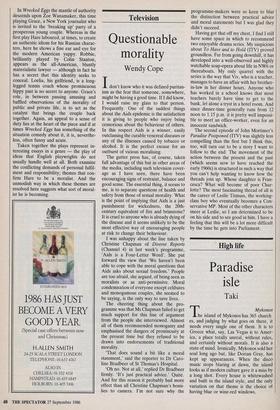Theatre
The Bay at Nice Wrecked Eggs (National, Cottesloe)
Moral Imperatives
Christopher Edwards
These two, new, short plays written and directed by David Hare make a com- plementary pair. The first is set in a museum in Leningrad in 1959, the second in present-day America in a well-appointed summer house overlooking the Hudson River. As we shall see, although divided by time and place, they share certain common moral assumptions.
In The Bay at Nice an old woman, Valentina, is brought to a room in a Soviet state museum by her daughter. The point of her visit is to identify a picture that has been bequeathed to the nation by an exiled White Russian Count. The old mother, who studied in Paris under Matisse, is persona non grata but recognised as an authority on Matisse. At the end she identifies the picture as, indeed, by her old master.
The audience never sees the picture. Nor does it need to, for the drama does not really turn upon the verification of a picture. Indeed, we could have done with- out some of the faintly absurd quivering which leads Valentina to her intuited con- viction that the picture is original. The play is really a moral argument. Valentina, played by Irene Worth, is a woman of high principle. When she conceived her daugh- ter in Paris (by one of her several bohe- mian lovers) she returned home to Russia instead of having an abortion and con- tinuing her life of instruction and pleasure. She wanted her child to be Russian, despite the cost to her own career. And the White Russian's bequest to his country represents a more obscure form of duty this time to his country.
Matisse's duty to his genius is described by Valentina in a series of grandiloquent and occasionally sentimental speeches. Essentially she applauds his dedication to his craft and his disregard for the relatively unimportant demands of the ordinary self; in other words he had no time for love. This is a harsh doctrine to put before her untalented daughter (Zoe Wanamaker), who wants to 'fulfil' herself by leaving her husband and children for a kind, 60-year- old civil servant. A shrill, and familiar, self-righteousness confirms to us that she will take that step even at the expense of her family. She claims a 'right' to happi- ness.
The debate, although it resists schematic analysis, seems to favour the uncomprom- ising mother; an unfashionable resolution. Certainly Irene Worth, with her haughty disdain for cant and moral fudge, succeeds in earning our respect. Here is a fine classical actress creating a character of severe moral grandeur through whom Hare can challenge a prevailing idea of `freedom'. In Wrecked Eggs the mantle of authority descends upon Zoe Wanamaker, this time playing Grace, a New York journalist who is invited to the 'breaking up' party of a prosperous young couple. Whereas in the first play Hare laboured, at times, to create an authentic idiom for his Russian charac- ters, here he shows a fine ear and eye for the modern American yuppy. Robbie, brilliantly played by Colin Stanton, appears as the all-American, bluntly materialistic lawyer — although in fact he has a secret that this identity seeks to conceal. Loelia, his girlfriend, is a long- legged tennis coach whose promiscuous hippy past is no secret to anyone. Grace's role, in between passing amusing and baffled observations of the morality of public and private life, is to act as the catalyst that brings the couple back together. Again, an appeal to a sense of duty lies at the heart of the piece and if at times Wrecked Eggs has something of the situation comedy about it, it is, neverthe- less, often funny and acute.
Taken together the plays represent in- teresting essays in a genre — the play of ideas that English playwrights do not usually handle well at all. Both examine the conflicting demands of personal fulfil- ment and responsibility; themes that con- firm Hare to be a moralist. And the unmodish way in which these themes are resolved here suggests what sort of moral- ist he is becoming.



























































 Previous page
Previous page